-
OLD BEAST/LAO SHOU (Jhou Ziyang 2017)
JHOU ZIYANG: OLD BEAST/LAO SHOU (2017)
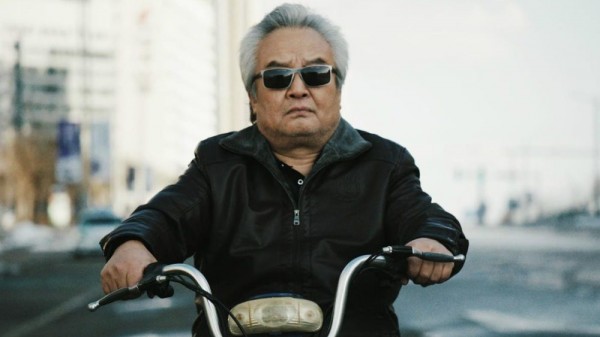
TU MEN IN OLD BEAST
Family relations
Lao Yang (Tu Men), the center of this tale, is a despicable sixty-something pater familias who at first just seems a wretch. His wife is dying in the hospital and he is lavishing expensive gifts on his mistress and grandson and blowing cash at cheesy massage parlors and Mahjong dives. And it gets worse. His married siblings wrangle over the cost of an operation for his wife, their mother, and when they reluctantly agree and put money together, he steals it and blows it. Then an old shepherd buddy leaves him his camel, which is awaiting the vet, and he sells the camel and pawns his little motorbike to buy a cow, which he fobs off on his naive friend as more profitable than the camel. The family are so angry they lock him in a cellar. But cell phones are wonderful, and he gets the police to let him out, and sues his family. That, later, he regrets, when he wins.
But in this beautifully photographed film (by Belgian China resident Matthias Delvaux) with its compelling lead performance there is more than just the picture of an aging rogue digging himself into a deep dark hole. This is a grim watch but also a complex and original one - even if its picture of modern China, with its failed new city and squabbling, mercenary and selfish youngsters, is not so unusual.
The setting plays a constant role. It is the city of Ordos. And therein lie Lao Yang's extenuating circumstances. In Inner Mongolia, it's perhaps the government's most spectacular failure among its new towns to resettle populations in (hopefully) growing industrial areas. It's a vast cluster of old slums and abandoned new highrise developments laced with grandiose statuary. As Lao Yang tools around on his little motorbike, with his small, plump body and big head topped with a grand mound of pearly gray hair, his bravely youthful leather jacket and pseudo-stylish sunglasses, the Neverland of failed urban development hovers with mocking indifference behind him.
Here, real estate collapsed, and Lao Yang was in real estate. But before that decline of his fortunes, he was successful, and from his manner, probably powerful (the actor, Tu Men, once notably played Genghis Khan). He worked hard to get his children educations and set them up with careers and spouses. Now, they don't need him. In this context, his dissolute behavior is an act of protest in the face of ingratitude. The spouses of the children are chillier than the children themselves. These general facts either you know or you figure out, in watching. They are embedded in the action, emerging in remarks Lao Yang makes. "You don't like Lao Yang?" this movie says: "Well, just look at the rest of his family." There's no one to like.
At first, with his late night gambling and his outer polish and mask of white hair Lao Yang made me think of Roger Duchesne in Jean-Pierre Melville's Bob le Flambeur. But Bob is a benevolent, failed crook, whose gambling hurts nobody. His elegance doesn't get tarnished. He is nice to his concierge. Still Lao Yang is an unusual choice of protagonist and he makes you cast around. Later as events stayed gloomy and got darker and Lao Yang got blood on his nose and mud on his shoes, my thoughts turned to the films of Robert Bresson. But that won't work either because here the struggling is menial and never ennobling as in Bresson.
There are indications in this feature debut that Jhou Ziyang is a quite original voice. He has found a unique point of view in this unlikable protagonist, and a specific place in this big hulk of a city.
What is Lao Yang doing at the end when he returns home to care for his dying wife? Has he reformed? Has he repented? Or has he merely found the only comfortable birth for himself and a new maliciousness behind a new mask? At times he has only his cigarettes and his flip phone, and his cigarettes are rumpled and his flip phone is losing power. Lao Yang is one of the loneliest men in Chinese cinema. And that's something to see.
Old Beast / 老獸 Lǎo shňu ("Old Beast"), 108 mins., first appeared in July 2017 at Xining, then was noticed at Tokyo in Oct., and Taipei in Nov. and it was reviewed by Richard Kuipers in Variety and Clarence Tsui in Hollywood Reporter. It won three prizes and four nominations, getting the FIPRESCI Prize, Best Actor, and Best Screenplay (and Zhou penned his own screenplay) at Taiwan's Golden Horse awards. It received theatrical releases in China (Dec. 2017) and Taiwan (Jan. 2018), with other festival showings (Miami, Singapore); it was screened for this review as part of the New York Asian Film Festival at Lincoln Center, where it shows Tues., 3 Jul. 2018 at 9 p.m.
Last edited by Chris Knipp; 07-01-2018 at 09:53 AM.
-
WRATH OF SILENCE//BAO LIE WU SHEN (Xin Yukun 2018)
XIN YUKUN: WRATH OF SILENCE/BAO LIE WU SHEN (2018)
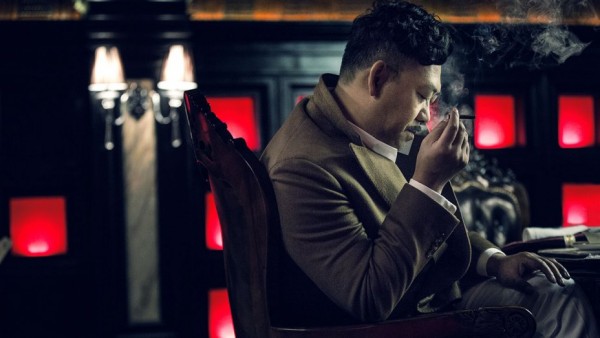
JIANG WU IN WRATH OF SILENCE WITH "A SQUIFFY HAIRDO" (ELLEY) - A MARCEL WAVE, A RURAL LUXE LIKE FOREIGN CIGS?
Mute revenge in the wilds
Derek Elley of Sino-Cinema as usual provides informed and linguistically savvy comments on this film, summarizing its elaborate plot, then evaluating the execution, comparing it favorably with careful assessment of the 33-year-old Chinese filmmaker's previous efforts. Clarence Tsui makes further claims for this new film in his Hollywood Reporter review.
The lead character is a mute miner, Zhang Baomin (Song Yang), who returns to the dusty Inner Mongolian hills to find his 12-year-old sheep-herding son missing and foul play, not for the first time, going on among the mining companies on the part of the local tycoon, Chang Wannian (wuxia movie vet Jiang Wu). Chang is "villainous," with all that implies of the slightly over-the-top. In between is Xu Wenjie (Yuan Wenkang), a cleancut looking but morally tainted lawyer under investigation for activities with Chang.
Reviewers consider this to be a film that plays impressively with elements of Western and noir genre. Elley comments that Xin's 2014 debut had "unnecessarily arty" elements, but this movie "falls somewhere between commercial and arthouse cinema in consistently interesting ways."
Whether the balance feels right depends on the viewer's commitment to the action, which for me wavered at first. It seemed the opening scene's exploitation of the photogenic quality of sheep; a suddenly missing small boy; a vengeful, angry mute man; and a sleazy local boss stuffing his face with greasy chunks of meat were laying on the cinematic gestures rather thick for just the first fifteen minutes. But isn't one of my favorite modern movies, Jim Jarmusch's Dead Man, pretty much an oddball, arty Western through and through? There's no doubt that Xin Yukun wields his version of a cowboy revenge movie with skills equal to ambition,helped by a Korean martial arts director for fight sequences and a cadre of accomplished and known professional actors in key roles.
It's nothing like Dead Man, of course. It does not subvert genre in such an original way and is more just an actioner. Despite occasional artful juxtapositions by the editor, Hu Shuzhen, the arty feel fades by midway when the film settles into a lot of chasing around, with two missing children and Baomin taking on crowds of bad guys singlehanded. It's modern western, basically, with an Asian martial arts vibe, in which people just have flip phone rather than smart phones. Actress Tan Zhuo, by the way, stays at home, underused, as Baomin's wife, Xia Cui.
Wrath of Silence / 暴裂无声 (Bao lie wu shen, "breakless silence") 119 mins., debuted Jul. 2017 at First International Film Festival Xining, then showing at London, Taipei, Singapore, Macao. It was screened for this review as part of the 2018 New York Asian Film Festival, showing 9 July 2018 at 6:30 p.m. New York Premiere · Q&A with director Xin Yukun and actor Jiang Wu, who will receive the Star Asia Award.
Last edited by Chris Knipp; 07-17-2018 at 12:15 AM.
-
PARADOX (Wilson Yip 2017)
WILSON YIP: PARADOX (2017)
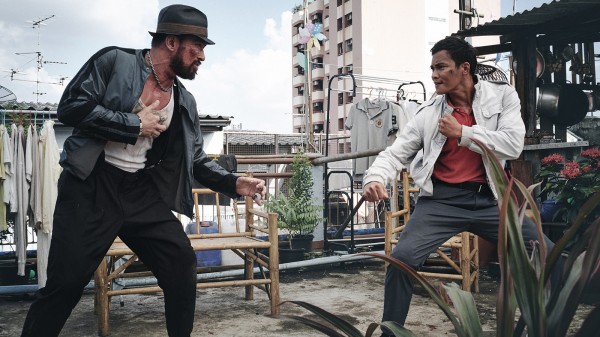
CHRIS COLLINS AND LOUIS KOO IN PARADOX
A trip to Thailand
Paradox is as adept as many other Hong Kong action movies, including the two previous of the 'SPL' franchise to which it is linked. This one takes us from Hong Kong to a new location and a kidnapping for very nefarious purposes. The themes of pregnant daughters and organ theft are interwoven in a pretty disturbing way. But they're there not so much for any depth of exploration as to function as engines for action requiring a variety of bad guys and some frenetic running around.
At the center is Hong Kong cop Lee Chung-Chi (the handsome and buff and newly martial-arts-ready Louis Koo). His teenaged daughter Wing-Chi (Hanna Chan) brings the unwelcome news that she's pregnant by some uneducated stranger she wants to marry now. Rather than blessing this union, Lee gets the boy arrested, and this leads Wing-Chi to flee to Thailand, where's she's kidnapped by organ thieves to provide a heart transplant for the aging and ailing mayor of Bangkok seeking reelection. Given that his brutality has set off the fate of his daughter, the heroic Lee isn't so heroic after all, an aspect that might have made for richer treatment than it gets here.
The mayor and his breathtakingly unscrupulous manager Cheng Hon-Sau (Gordon Lam) provide one subplot. The organ theft kingpin, a burly and crude American called Sacha (Chris Collins) whose cover is a meatpacking plant, is the other. Lee links up with local cops Chui Kit (Wu Yue) - whose wife is pregnant (another, parallel, subplot) and ranking officer Chai (Vithaya Pansringarm) - a little too close to local government bosses to be honest. They are joined, all too briefly, by the acrobatic Thai martial arts star Tony Jaa, as a another local cop. As Lee pursues his search sometimes with fellow cops, sometimes on his own, he's occasionally also helped by a good-hearted hooker (Jacky Cai).
If a righteous, vengeful cop wiping out a horde of bad guys in a warehouse is your thing Paradox will be all you need. The action sequences are relentless and hyper-active. The scenery is pretty. The bad guys are really bad. But there isn't enough complexity to the plot to make this stand out from so many Hong Kong action movies with cops and bad guys. The local industry is shown by this festival selection to be producing this genre as well as ever, but it becomes ever harder to bring out a truly original one.
If Paradox stands out from its peers, it could be for the preponderance of brutal hand-to-hand combat, which includes a wealth of knife-cuts and spurting blood, all executed with precision and clarity. A man listening to a beating heart may be the most memorable image, however. Sammo Hung was in charge of the fight choreography. The work of dp Kenny Tse is impeccable. The writing of Nick Cheuk and Lai-Yin Leung could have been more plausible. For a convincing tale of organ theft, go to Stephen Frears' 2002 Dirty Pretty Things , or for a truly great film about a dicey heart transplant, watch Claire Denis' 2004 L'intrus/The Intruder.
Paradox / 殺破狼・貪狼 (Sha po lang: taam long, "The Killing Wolf"), 98 mins., opened in China, Singapore, Hong Kong, Taiwan and Thailand in Aug.-Oct. 2017, showing at San Diego and Taipei Nov., releasing i South Korea and Japan in 2018. Screened for this review as part of NYAFF, showing 4 Jul, 2018 at 7:45 p.m.
Reviewed in Hollywood Reporter and Screen Anarchy .
Last edited by Chris Knipp; 07-03-2018 at 12:25 AM.
-
HIT THE NIGHT (Jeong Ga-young 2017)
JEONG GA-YOUNG: HIT THE NIGHT (2017)
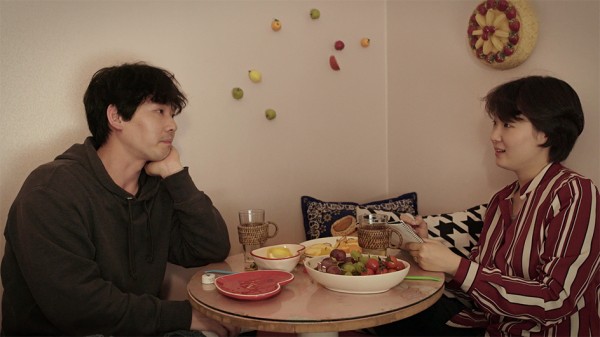
PARK JONG-HWAN AND JEONG GA-YOUNG IN HIG THE NIGHT
Boy hunting in the rough
Jeong Ga-young is most known in Korea as an actress, but as she turns to directing as well, she invites the description of "female Hong Sang-soo" with this film consisting, like Hong's, of long scenes of talking and drinking. This variation lacks the polish or the charm of Hong, but in its relative crudeness and its flipping of the gender roles, it may have more bite.
An aspiring female director, also called Ga-young and played by Jeong, seeks to seduce male acquaintance Jin-nyeok (Park Jong-hwan) through a lengthy, provocative interview, ostensibly conducted as parparation for a film (she takes notes). Ga-young delves into Jin-nyeok's love-life over a night of drinking. Jeong is small, with short hair. Jin-nyeok is tall, with bushy, boyish hair (Park has worked as a fashion model). Jeong started as a director with the 2016 Bitch on the Beach, which references Hong Sang-soo directly. This Ga-young is neither subtle nor romantic, starting right out with questions about how many times Jin-nyeok masturbates, whether he thinks of his girlfriend as he does so, and so on. Jin-nyeok is a sufficiently complex (and understated) personality to make the outcome uncertain.
Jin-nyeok may be the boy of Ga-young's dreams, and at least she hints that she's interested, but he repeatedly says that he isn't. Given her laughably inappropriate approach, that's no surprise. We also understand that she is paying him for this "interview," though its purpose as preparation for a film seems dubious. On the other hand, Jin-nyeok doesn't walk away.
The evening starts with dinner, then moves on to drinks, and ends with karaoke. The drinking they do at a kind of club with booths. When Jin-nyeok goes to the bathroom, he has a hard time remembering which booth they were in. At the Karaoke club, a plump, bespectacled friend of Jin-nyeok's appears. She goes walking with this new guy,who unlike Jin-nyeok, is quite willing to kiss her. They seem to hit it off. But she won't allow him to accompany her home. She calls back Jin-nyeok, saying the interview wasn't over, and there is more conversation, unsatisfying for her.
There is discussion of a film Ga-young made or wanted to make, a sort of knockoff of Park Chan-wook'sOldboy, and uncertainty about the ending. And so Jeong prepares us for the non-ending of this film, with Ga-young alone, back at her apartment, sitting at a desk.
As one who has watched with pleasure a dozen or so of Hong Sang-soo's prolific output, it was natural to be curious about a female version, but I was somewhat disappointed, since this movie not only lacks the fluency and sparkle of Hong, but also Jeong, as an actress, is blatantly no match for the beauty and vivacity of Hong's current muse, Kim Min-hee. On the other hand, one can see how Park Jong-hwan could have won an acting prize. He disappears into his role seamlessly, making every reaction and answer feel spontaneous. And there is finally something solid here. In the relative crudity of Jeong's film compared to Hong's, the awkwardness of the situation, with the confident but abashed man and the timid predatory woman, is allowed to feel complex without any external effort, and the role reversal, coming in Korea in the "Me Too" era, has resonance.
But all is not aces here. The minimal situation and talky two-hander wears out its welcome half way through if not before. The tech aspects are only so-so, with some imbalances in the sound.
Hit the Night / 밤치기 (Bam-chi-gi, "Chestnuts"), 85 mins., debuted at Busan, where it won the Actor of the Year Award (for Park Jong-hwan) and the Vision-Director's Award. It also showed at Rotterdam in Jan. 2018 and in competition in the Seoul International Woman's Feature Festival Jun. 2018. Screened for this review as part of the New York Asian Film Festival, showing July 6, 2018 at 6 p.m.
Last edited by Chris Knipp; 07-03-2018 at 12:39 AM.
-
THE EMPTY HANDS (Chapman To 2017)
CHAPMAN TO: THE EMPTY HANDS (2017)
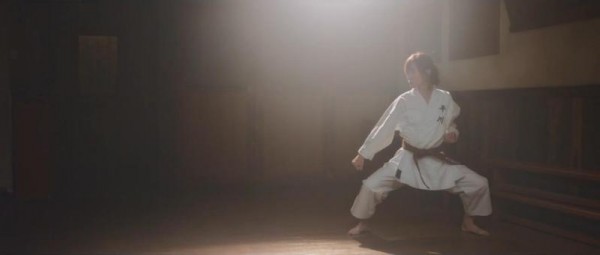
STEPHY TANG IN THE EMPTY HANDS
A girl can't be herself
In his second outing as a director, in which he also costars, Hong Kong actor Chapman To (Du Wenze) takes on the amusing and original tale of a young woman called Mari (Stephy Tang, in what has been heralded as a career-best performance) and her struggle to break away from the strict lifestyle of her Japanese karate master father (Kurata Yasuaki) after he suddenly dies. Here is female empowerment, accompanied by many droll as well as serious ironies.
Mari has had to grow up in a not-so-huge Hong Kong apartment that was mostly a karate dojo. Set design is one of this movie's special delights, particularly of the apartment, with its austere, zen dojo and the little, cramped living space it allows, a mass of crushed-together clutter. Daddy forced Mari to participate fully in his karate world, training and competing intensely, which she never liked, despite a gift for it. She finally quit, and they became estranged, while she snuck away frequently to enjoy a love affair with a married man, a radio DJ named Calvin (Ryan Lau). Then, when her father dies, Mari rejoices at the prospect of closing the dojo, whose business has dwindled lately anyway. She will live a free life, subdividing the well-located apartment into tiny apartments and living idly as a Hong Kong slumlord.
But that is not to be. Cue to lawyer-reading-the-will scene. Her father, it transpires, has left 51% of the dojo to a former student Mari can't even remember, the - to her - mysterious Chan Kent (Chapman To) a man who turns out to have just been released from prison. And so, to Mari's distress, Chan Kent comes to take over the running of the dojo with Mute Dog (Stephen Au), her father's main teacher, whose gruff ways she had hoped to be rid of. To make matters worse, Mari's boyfriend, Calvin, has just broken up with her. Her only comfort is her longtime friendship with buxom and down-to-earth BFF Peggy (Dada Chan), who works in a massage parlor with bj finales.
The movie unfolds all these complex details efficiently and entertainingly in the first half hour, including flashbacks to Mari's force-fed karate childhood, love-scenes with boyfriend Calvin, combative cuddles with Peggy, and noble, solitary karate workouts by Mari's chilly but distinguished-looking Japanese father, accompanied by the occasional splash of baroque music. Later an elegant flashback shows how Kent was rejected by Mari's dad for using karate selfishly, then got his several years' jail time for assault using it as he would like, to protect a little girl against a sexual predator. It is at this point, on his release, that he and Mari meet.
Then, when she makes her objection to life with him running the dojo clear, Chan Kent has a proposition: if she will enter a karate contest and simply remain standing, whether she wins or loses, he will sign off his part of the property to her and she'll never see him again. She does this, encountering a small but muscular and rough opponent who smashes her bloody. Many flashbacks - neatly done - show how her father's teachings have fortified her, though, and in the end she triumphs. The fight, despite all the cross-cutting, is very convincingly staged, Stephy Tang's karate chops convincing throughout.
Director To delivers a final sequence that neatly contrasts with this busy action. He takes a step that's so artistically valuable and so rare: he lets the film stop to breathe, with Mari alone in the dojo, having an imaginary dialogue with her father. As the film ends. nothing is decided, and we are left to contemplate its themes of rebellion, responsibility, and self defeat.
THE EMPTY HANDS / 空手道 Hung sau dou ("Karate"), 87 mins, opened theatrically 2 Nov. 2017 in Hong Kong, and in early Jan. 2018 in Taiwan; also was shown at Singapore May 2018. It was screened for this review as part of the New York Asian Film Festival, showing 6 Jul. 2018 at 8:15 p.m. Q&A with actress Stephy Tang, who will receive the Screen International Rising Star Award.
See Derek Elley's sino-savvy review on Sino-Cinema for further details, including the actual Chinese names of the actors, etc. Elizabeth Kerr wrote a review for Hollywood Reporter ("One of the strangest martial arts dramas ever made").

[SIZE] DESIGNER CLUTTER: MARI'S BEDROOM IN THE EMPTY HANDS.[/SIZE]
Last edited by Chris Knipp; 06-28-2018 at 07:51 AM.
-
THE RETURN (Malene Choi 2018)
MALENE CHOI: THE RETURN (2018)

THOMAS HWAN IN THE RETURN
Root canal
This quiet, haunting hybrid of documentary and fiction was made by Danish-Korean adoptee Marlene Choi in Korea and focused on the story of two thirtyish Danish Korean adoptees, Karoline (Karoline Sofie Lee) and Thomas (Danish TV actor Thomas Hwan), who come to Korea in search of their origins. Though feeling quite specific, they stand for many. As it turns out, since the Korean War in 1953 South Korea has been a major exporter of babies for adoption, over 200,00 having been raised mainly in Europe and the US.
Karoline arrives at Koroot, a group home specially provided for Korean adoptees. Here Karoline meets Thomas and other visiting Korean adoptees who come from America and communicate in English. A hunky young man from America tells a radical story. This is his second time in Korea. The first time, he immediately felt at home, so much so that when he left, it felt wrong. His adoptive parents objected to his exploration of his origins, and, given a choice between them and that, he has chosen to live in Korea. Like the others, he has not learned the language. Has he ever seen a Korean film? His decision is passionate, instinctive. It may be an emotional reaction to growing up feeling like an outsider. He has no idea what he is getting into but certainly here, he will look like he fits in. It's complicated. He has simplified it.
The visiting adoptees share experiences of being bullied in one way or another for being different, not being white. An older woman adoptee talks about her experiences of finding her biological parents and meeting them. When she met her father, she says she felt nothing. Only later she was very moved by the struggles of her mother, who became disabled relatively young, it turns out. She has returned to spend time with her mother.
Karoline goes to the Holt adoption agency, where the representative offers her little hope of finding out anything. Records were not kept, she says. Thomas says they lie, and offers to go back with her, as they do. Eventually it does emerge from help reading her Korean documents from the agency that she was born in a hospital on a small island off Inchon.
The truly profound scene is the one when Karoline and Thomas go to meet Thomas' biological mother, who has been found. They go with a female interpreter who translates back and forth between Korean and English. Thomas' mother is sweet, plying them with a meal prepared together in a small apartment. He was the result of a quick union with a boy who vanished, when she was very young. Her tale is of heartbreaking regret for having given up Thomas for adoption too hastily.She married, but never had children. All her life she has been haunted by longing to be with him. This quiet, underplayed scene is masterful in administering an emotional wallop with economical means. Realization that this sequence is staged, not "real," may undercut it, but not lessen its almost archetypal emotional power.
The use of staged elements for the framework narrative of the film allows Choi to experiment. The film uses innovative, subtle camerawork, editing, and sound to convey vividly the feeling of excitement and dislocation, of confusion and emotional dissonance Karoline and Thomas feel from first arrival. This helps to strengthen a very thought-provoking film that conveys as well as any movie yet what it is like to be adopted from a far-away country and long to understand and be reunited with one's origins. The writer, Sissel Dalsgaard Thomsen, has contributed substantially to giving the dialogue, particularly in Danish, a natural and specific feel.
The Return, 87 minS., debuted at Rotterdam and was reviewed by Screen Anarchy (Paige Lim) and Variety (Alissa Simon) at Göteborg Feb. 2018. Reviewed there for Variety by Alissa Simon .
Last edited by Chris Knipp; 07-16-2018 at 11:14 PM.
-
THE AGE OF BLOOD/YEOKMO - BANRANUI SIDAE (Kim Hong-sun 2018)
KIM HONG-SUN: THE AGE OF BLOOD/YEOOKMO - BANRANUI SIDAE (2017)
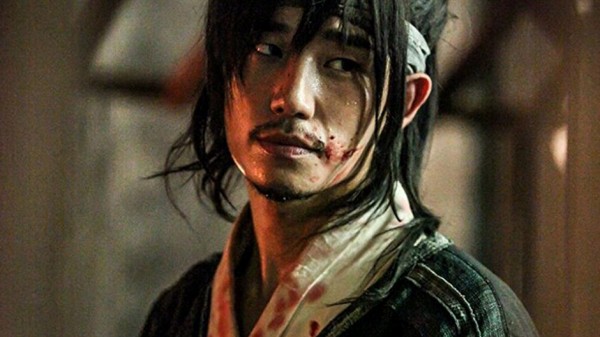
JUNG HAE-IN IN AGE OF BLOOD
Historical pleasures
This historical fight movie from Korea is big-time eye-candy built around new local heartthrob Jung Hae-in, usually a smiling and boyish type who looks great topless. It begins with a background review that's animated, and morphs seamlessly into stylized movie mode. Yes, this is about a historical event, though reinterpreted here. It concerns a rebellion. A lot of the fight action takes place at night; hence the sword and bow-and-arrow fights are depicted in extreme chiaroscuro that is frustrating if you want blow-by-blow detail but makes for artistic effects.
Jung Hae-in, who's thirty, has only been a name actor for four years, and thinks his fame won't last. (Maybe so, but he's enjoying himself for now.) He's known from TV series, a historical one, like this, called "The Three Musketeers," and a drama about three people who can foresee crimes, called "While You Were Sleeping." In civvies, Jung Hae-in has a slightly goofy look, like a surprised child. For Age of Blood he has been fitted with long, stylishly unruly tresses, a mustache, and chin whiskers. It makes all the difference. In this disguise, and various sharp period costumes, he sometimes looks dashing. He also looks goofy sometimes too.
In this movie, Yeongjo is the reigning ruler, 21st king of the Korean Joseon Dynasty. He is reputed to have poisoned his brother to become king. Kim Ho (the Jung Hae-in) is an ace swordsman who has been waiting around for an appointment for some time. When it finally comes, he's astonished to learn he's been demoted to the level of prison guard. Little does he know that this will be the most important place to be in the kingdom, and that the night of his arrival will be a decisive time. The prison is a dramatic setting, sometimes seen from above, it is a long one-story complex in a rectangular shape with a big central enclosed space. Kim Ho encounters various guards (he doesn't like the uniform; they mock him for boasting that he'll rise to senior guard quickly), and several unsavory prisoners.
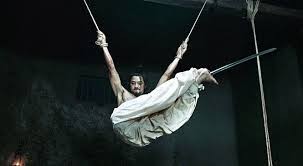
A striking interlude shows an unbelievably handsome, hunky, and sexy prisoner, nude to the waist in white and hung up by his hands, awaiting execution. Denied a drink of water in a cruel and mocking manner by a guard, he manages to break free, grab a sword, and execute the guard.
The main action begins when a group of conspirators break into the prison to set free their leader, who has been imprisoned, and Kim Ho takes them on. Joe Bendel, who has reviewed this film on JB Spins, adds more about the cast: "Hong Soo-a is also shows off some nice chops as Lady Yoo Seo-yeong, Kim Ho’s unexpected ally," and "Kim Ji-hoon’s Lee [the rebel leader] is arguably too cold-blood, but Jo Jae-yun is terrific as Do, the intense but honorable adversary." Kim Ho is arguably defending an illegitimate regime, established through a crime, but he is supporting the office, not the man. Anyway, all this, though entertaining and beautiful to look at, is only skin deep and shouldn't be judged too harshly as historical drama, even if that's what it it ostensibly is. There are discernible characters and there is a historical plot line, but the movie most notably exists as a stylish and polished excuse for a series of dashing battles and other displays of daring-do, with other visual pleasures thrown in.
The Age of Blood/ 역모 - 반란의 시대 Yeokmo - banranui sidae ("Conspiracy - The Age of Rebellion"), 102 mins., opened in Korean cinemas Nov. 2017, and debuted on Japanese TV May 2018. It was screened for this review as part of the 2018 New York Asian Film Festival, where it shows at 12:30 July 4th. It can be watched free on Amazon Prime.
A Korean movie blog in English, Drama Beans, provides a knowledgeable preview of this "gritty action sageuk [Korean historical period drama]."
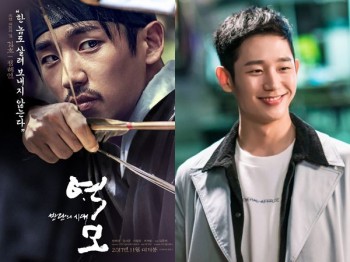
JUNG HAE-IN, IN AGE OF BLOOD AND IN CIVVIES
Last edited by Chris Knipp; 07-03-2018 at 09:49 AM.
 Posting Permissions
Posting Permissions
- You may not post new threads
- You may not post replies
- You may not post attachments
- You may not edit your posts
-
Forum Rules





 Reply With Quote
Reply With Quote









Bookmarks